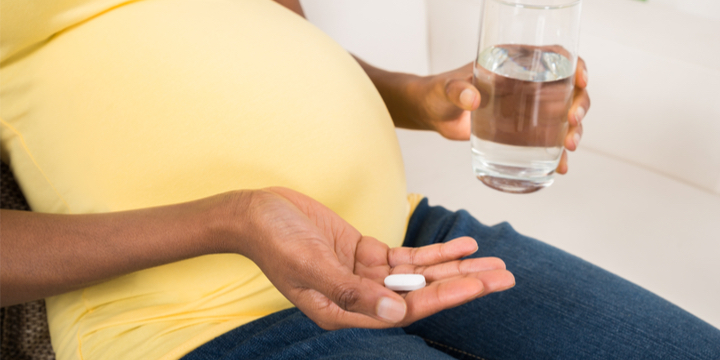Long-term treatment or one-off taking, taking a drug during pregnancy is never trivial. Pregnant women should avoid any self-medication or discontinuation of treatment without medical advice, recalls a ASNM campaign launched on June 2. “Pregnant, drugs, it’s not just any old way!”, Warns the slogan of this countryside.
Read also : Pregnancy: watch out for iodine supplements
A thousand births per year
Two to three percent of babies are born with a major defect and a European study attributes 5% of cases to taking medication by the mother. On a French scale, this would represent 800 to 1,200 births per year out of 800,000.
These dangers also concern products often wrongly perceived as harmless, such as herbal medicines and essential oils, warns the drug gendarme.
Great risks for the fetus
The risk of malformations (of organs or limbs) is greatest in the first trimester of pregnancy. This is particularly the case with roaccutane (treatment of severe acne), depakine (treatment of epilepsy and bipolar disorder) and thalidomide-based drugs (sedative and anti-nausea).
Taken later in pregnancy, other drugs like ibuprofen (an anti-inflammatory and pain reliever) or treatments for high blood pressure can slow the growth of the fetus or the proper development of the kidneys. Certain treatments can also be involved in the appearance of developmental disorders (autism, hyperactivity).
Widespread drugs
“Pregnancy is a special period during which the intake of drugs should generally be avoided” because even the most common, such as some painkillers or anti-nausea drugs, can “have immediate or future repercussions on the unborn child” , explains the ANSM.
“This risk is not 100%, fortunately: it is not because I am going to take a drug that it will have an effect” on the unborn child. But a single dose “can sometimes be enough to generate an effect, including involuntary terminations of pregnancy”, specifies Céline Mounier, director of surveillance at the ANSM.
Lack of information
Almost 7 in 10 women say they are fully informed about the risks associated with alcohol or tobacco consumption during pregnancy. However, only three in ten say so when taking medication, according to a survey conducted by the Viavoice institute carried out online among women aged 18 to 44 in two waves with 3,586 women, in 2019 and 2020.
“The aim is to trigger in society a reflex equivalent to that of alcohol and tobacco during pregnancy,” explains the National Medicines Safety Agency (ANSM).
According to the survey by the Viavoice institute, 36% of women pregnant with their first child took a drug on their own initiative. This figure rises to 48% among pregnant women who are not pregnant for the first time.
Do not stop treatment without medical advice
Conversely, one in six women who took a prescription drug stopped it without medical advice, mainly because she did not want to take risks for her child, while any stopping or modification of treatment must also be decided on advice. medical, especially for chronic diseases.
Thus, “an unbalanced diabetes can have consequences for the woman and the unborn child”, warns Céline Mounier.
The agency wants to “encourage dialogue” with caregivers from the pregnancy project, because some drugs produce effects for several months and others are risky from the first weeks of pregnancy, at a time when women are still unaware that they are pregnant.
 Cherry tomatoes contaminated with salmonella: 92 sick and 1 dead
Cherry tomatoes contaminated with salmonella: 92 sick and 1 dead  A better coaching method can make a person grow
A better coaching method can make a person grow  What is the method to prevent diabetes in children?
What is the method to prevent diabetes in children?  What are the effective factors in causing stomach ulcers?
What are the effective factors in causing stomach ulcers?  Why do embarrassing memories seem to appear at night?
Why do embarrassing memories seem to appear at night?  The amazing link between SARS-CoV-2 infection and newly started diabetes
The amazing link between SARS-CoV-2 infection and newly started diabetes  WHO says monkey pox is not a global emergency right now
WHO says monkey pox is not a global emergency right now  Single cell RNA sequencing uncovers new mechanisms of heart disease
Single cell RNA sequencing uncovers new mechanisms of heart disease  Hepatitis of unknown origin: 3 new deaths and 228 cases worldwide
Hepatitis of unknown origin: 3 new deaths and 228 cases worldwide 